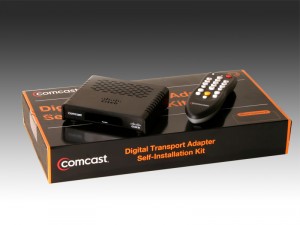
Comcast: Get a box or lose your cable TV service
Comcast will encrypt the entire lineup of its cable television service, including local channels, starting with two markets in New England and gradually rolling out this summer across all of Comcast’s service areas.
The encryption will obsolete cable reception of QAM signals, which some cable customers use to avoid paying for set-top equipment.
Comcast called FCC approval of its encryption request a victory for consumers because it will “allow us to automate certain system functions and will reduce the need for scheduled in-home appointments, providing greater convenience for our customers.” Comcast also candidly said it will dramatically reduce signal theft and unauthorized viewing by past due customers, which can now be shut off from the cable office instead of dispatching technicians to the home to disconnect service.
Consumer and Comcast customer Brier Dudley begs to differ. In two columns in the Seattle Times, Dudley writes Comcast is tightening the screws on its customers, forcing them to get unwanted equipment that will eventually cost them monthly rental fees set “at market rates.”
Comcast began requiring digital adapters to unscramble digital signals in 2009. Since then, it steadily has been converting more of its system to digital, scrambling more channels and expanding the requirement to use some kind of a cable box or adapter on every TV.
This requirement received the FCC’s blessing last year. The agency agreed to let cable companies scramble all of their channels and require descramblers on every set.
The FCC’s justification was muddled. Scrambling would purportedly prevent stealing content, though the FCC requires conventional television broadcasters to beam their shows freely over the air.
The FCC also made a tortured environmental argument for the move, saying the mandatory adapters allowed cable companies to remotely activate and deactivate service, reducing service calls and their carbon footprint.
Unmentioned is the environmental effect of factories in China making adapters that must be delivered, attached to every TV and continuously plugged in.
Comcast is attempting to mitigate customer anger about the necessary new equipment, offering free boxes for a limited time. But customers might need a road map to find what they qualify for without having to pay an even higher cable bill:
 Limited Basic customers with no set top boxes in their homes will be eligible for up to two DTAs (standard definition digital signal adapters), at no charge for two years (five years if you also receive Medicaid), if they request DTAs beginning 30 days before the date of encryption and no longer than 120 days after encryption. New customers, customers who already have DTA devices or those who request them after the offer period will likely be subject to rental fees much sooner, if not immediately;
Limited Basic customers with no set top boxes in their homes will be eligible for up to two DTAs (standard definition digital signal adapters), at no charge for two years (five years if you also receive Medicaid), if they request DTAs beginning 30 days before the date of encryption and no longer than 120 days after encryption. New customers, customers who already have DTA devices or those who request them after the offer period will likely be subject to rental fees much sooner, if not immediately;
Customers who subscribe to a higher level of service and receive Limited Basic service on a secondary TV without Comcast supplied equipment are eligible for one device at no charge for one year;
All other customers are subject to Comcast’s new $1.99 per month “additional outlet service charge” for each outlet registered to a DTA. In Seattle, customers who want to watch local channels in HD have to fork over another $2.50 a month for a special HD version of Comcast’s DTA box.
What if you don’t want the extra equipment and return it? Comcast will automatically cancel your cable TV service.
“Customers who do not have digital equipment on their account will not be able to view any channels after Limited Basic channels are encrypted. For this reason, XFINITY TV service will be removed from the account,” warns Comcast. “This may affect multi-product package rates or discounts.”
The encryption will also cripple third-party set-top devices like older versions of Boxee (not compatible with Comcast’s DTA) and TiVo, which will now need a mind-numbing, complicated workaround to keep operating.
Comcast customers will receive written notification as the company gets ready to encrypt service in each area.



 Subscribe
Subscribe
 Limited Basic customers with no set top boxes in their homes will be eligible for up to two DTAs (standard definition digital signal adapters), at no charge for two years (five years if you also receive Medicaid),
Limited Basic customers with no set top boxes in their homes will be eligible for up to two DTAs (standard definition digital signal adapters), at no charge for two years (five years if you also receive Medicaid),  What is the best way to win a big promotion at Cablevision? Be related to the Dolan family that founded the cable system.
What is the best way to win a big promotion at Cablevision? Be related to the Dolan family that founded the cable system.
